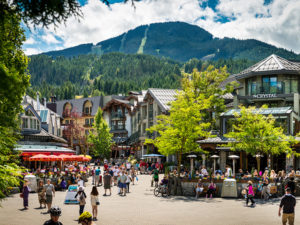A political mentor once explained to me why civility is key to long-term success, noting that “today’s worst enemy may be tomorrow’s only friend.” The reverse is also true. Erin Mundahl, an Inside Sources energy reporter, writes about left-leaning green-oriented resort towns coming under fire from environmental activists.
 She highlights a controversy raging in Whistler, British Columbia, a world-class resort and popular destination for skiers in winter, hikers in summer, and conventions year-round. In keeping with Whistler’s ordinary leftist enviro-politics, Mayor Jack Crompton wrote to 20 large energy companies, demanding money to compensate for global warming. “We are writing to ask your company to commit to pay a fair share of the costs of climate change being experienced by Whistler. Communities around the world are increasingly expecting you to take responsibility for your products.”
She highlights a controversy raging in Whistler, British Columbia, a world-class resort and popular destination for skiers in winter, hikers in summer, and conventions year-round. In keeping with Whistler’s ordinary leftist enviro-politics, Mayor Jack Crompton wrote to 20 large energy companies, demanding money to compensate for global warming. “We are writing to ask your company to commit to pay a fair share of the costs of climate change being experienced by Whistler. Communities around the world are increasingly expecting you to take responsibility for your products.”
The letter had a tremendous impact, but not like Crompton wanted. Protesters across Canada objected loudly, organized Whistler boycotts, and the town began to pay an economic price in lost tourism revenues. A large annual three-day investment conference included presentations by 43 energy companies. Several of them backed out of the conference, and the hosts announced they would move the conference, which draws hundreds, elsewhere because of the Mayor’s anti-energy activism. He was forced to back-peddle, but that has not stopped the economic hemorrhaging.
Similar battle lines have developed in other western resort communities, many of which suddenly find themselves seeking a balance between their green politics and their tourism-driven economies. As we see in Colorado, it isn’t always about energy and climate. Here, the disputes are frequently about water, or access to public lands – every bit as divisive as Whistler’s global warming argument.
That really shouldn’t surprise anyone. After all, some of the world’s most beautiful places are resort areas like Telluride, Crested Butte, Park City, or Jackson Hole. People from around the world flock to such incredible places, and they spend fortunes doing so. That is the heart of the matter. Those communities, originally built on mining, logging, and ranching, could not survive today without tourism. So these towns spend lots of resources promoting tourism. Sometimes, that pits them against environmental groups that have been their primary allies for years.
Consider the two-year dispute about a proposed 83-mile trail that would connect Carbondale, Aspen, and Crested Butte. Hikers, bikers, and other outdoor enthusiasts have found that some of the same arguments they use against oil, gas, and mining can also be turned against recreational development. The proposal has created serious tensions between local tourism businesses (including the skiing company, hotels, restaurants, and merchants) and many environmental activists who live in Aspen, at least some of the time. Some of those folks, to put it plainly, can be counted on to oppose virtually anything.
There was an old joke about the difference between an Aspen developer and an Aspen environmentalist. One wants a cabin on the mountain; the other already has one.
So far, the tourism industry is winning, and it will continue to win – in Aspen, Whistler, and all the other resort areas with similar battles. That’s because the leaders in such places understand – all political posturing aside – which side of the bread is buttered. After a recent hearing in Aspen, the Pitkin County Commissioners voted 3-2 to proceed with a feasibility study for the trail project. That’s because a majority of commissioners, all of them liberals and bona fide environmentalists, nevertheless understands that without tourism their views cease to matter.
Thus, they may rail against all kinds of development elsewhere, but their own economy is based on skiing, which requires clearing huge swaths of trees from the national forest, hiking and biking, which require construction of trails through the wilderness. They depend on festivals, concerts, and shopping, all requiring enormous amounts of energy, and its success depends entirely on airplanes and automobiles, neither of which have yet been banned in Aspen.
That apparent contradiction sets up a perpetual unhappiness for people who can never really be satisfied. You can imagine their thinking: “We stopped logging and drilling here, and we put an end to mining and grazing on the nearby forests. What a great victory for our side! Now we have skiing, hiking, music festivals, hordes of people – but wait, we’re against that, too. No more skiing, hiking, or festivals!”
Many resort towns have long been allied with the green movement, but as Erin Mundahl points out, they are finding out that alliance may end up costing them a lot of green.
This column originally appeared in the Grand Junction Daily Sentinel December 28, 2018.




Comments on this entry are closed.